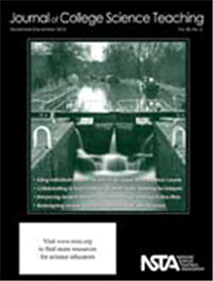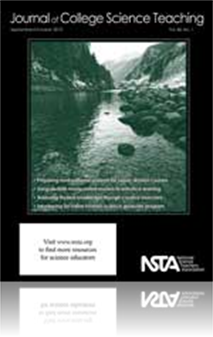All Journal of College Science Teaching resources
Journal Article
Art Instruction in the Botany Lab: A Collaborative Approach
Good observations are often fundamental to good science, and drawing has long been recognized as a tool to develop students’ observation skills. Yet when drawing in illustrated journals was introduced into botany laboratories in an undergraduate, t...
Journal Article
The valence-shell electron-pair repulsion model (VSEPR model) provides a simple way of predicting the molecular geometries. However, the particularly challenging part in demonstrating the VSEPR models is to show the “best” arrangement of bonding ...
Journal Article
It seems that every year, the author sees more examples in television, movies, and even books of dislike, distrust, and disdain of the field of science. In “real” life, she teaches increasing numbers of students outspoken in their assertions that...
Journal Article
Case Study: Cooking Under Pressure—Applying the Ideal Gas Law in the Kitchen
This case study uses a daily cooking scenario to demonstrate how the boiling point of water is directly related to the external pressures in order to reinforce the concepts of boiling and boiling point, apply ideal gas law, and relate chemical reacti...
Journal Article
Clickers Beyond the First-Year Science Classroom
This case study’s primary objective is to describe the implementation of the electronic response system (clickers) in a small (N = 25) second-year physics course at a large public university and to draw attention of the science faculty who teach up...
Journal Article
Research and Teaching: Data-Driven Implementation and Adaptation of New Teaching Methodologies
This paper describes an action research approach toward an implementation of a new teaching methodology (specifically active learning) in a preparatory college chemistry classroom. The initial implementation involved the use of process-orientated gui...
Journal Article
The departments of Geology and Education at Brooklyn College collaborated with five informal educational institutions in the development of a place-based graduate program for Earth science teachers. The team used “backward design” to develop a pr...
Journal Article
Message from the NSTA President: Imagine and Invent—Create a Great Future
The time is right for an emphasis on imagination and innovativeness in science education, both in students and in teachers. Change now dominates our economy and culture, and can only be realized through imagination and creativeness. Therefore, our ne...
Journal Article
Case Study: Using Photographs as Case Studies to Promote Active Learning in Biology
If a picture is worth a thousand words, think about how long it takes your students to read a thousand words. Case studies are effective and stimulating ways to teach a variety of subjects, including the biological sciences. In learning the details o...




